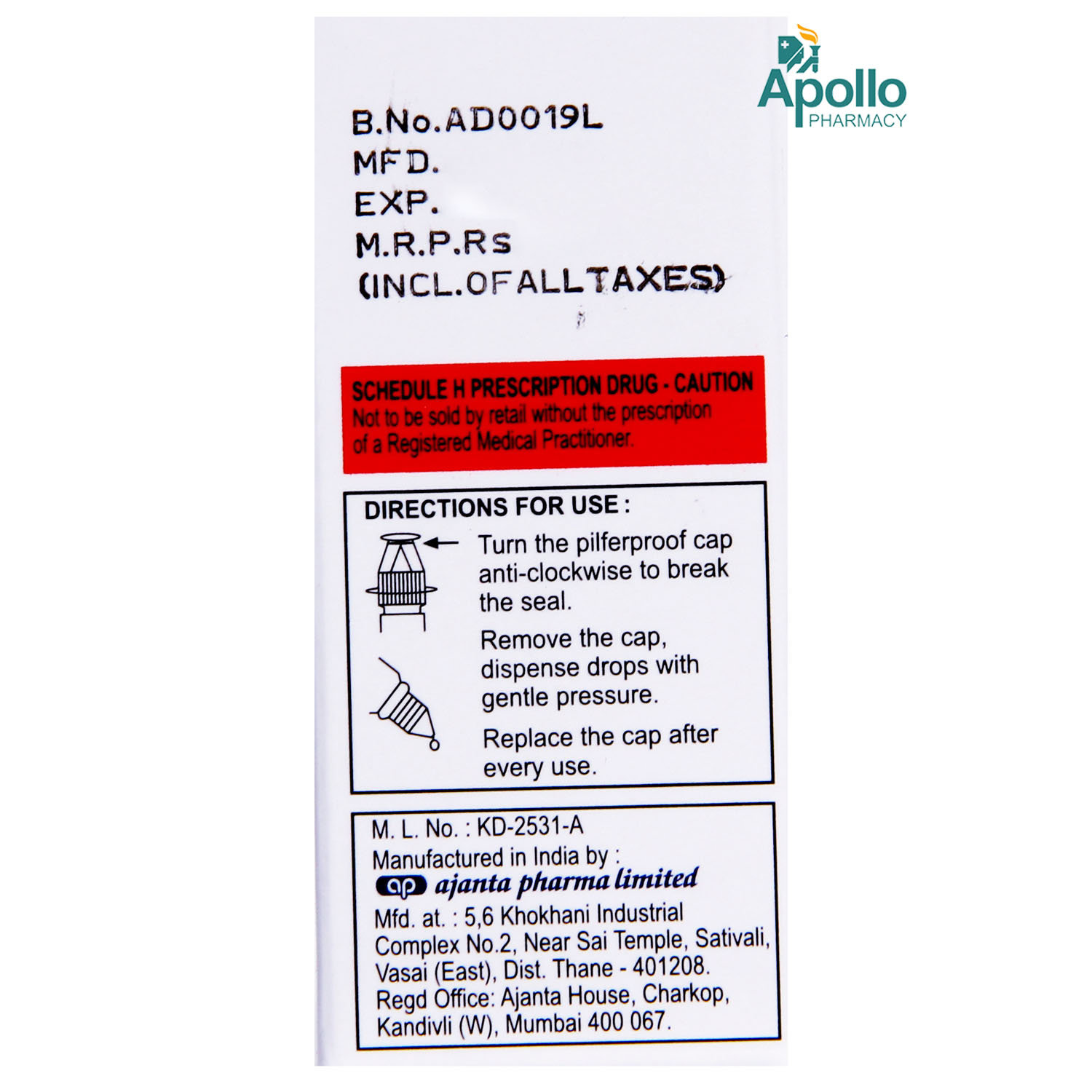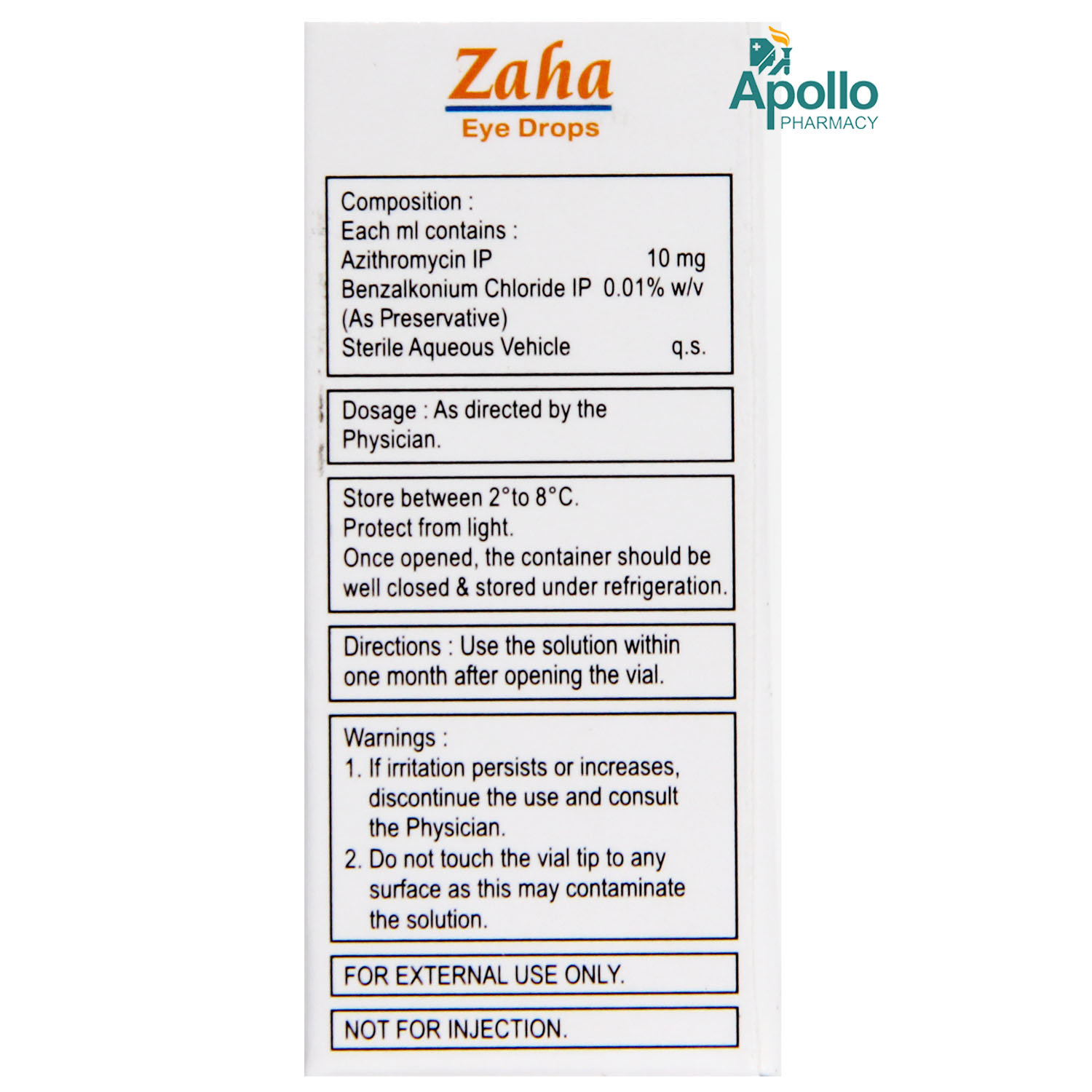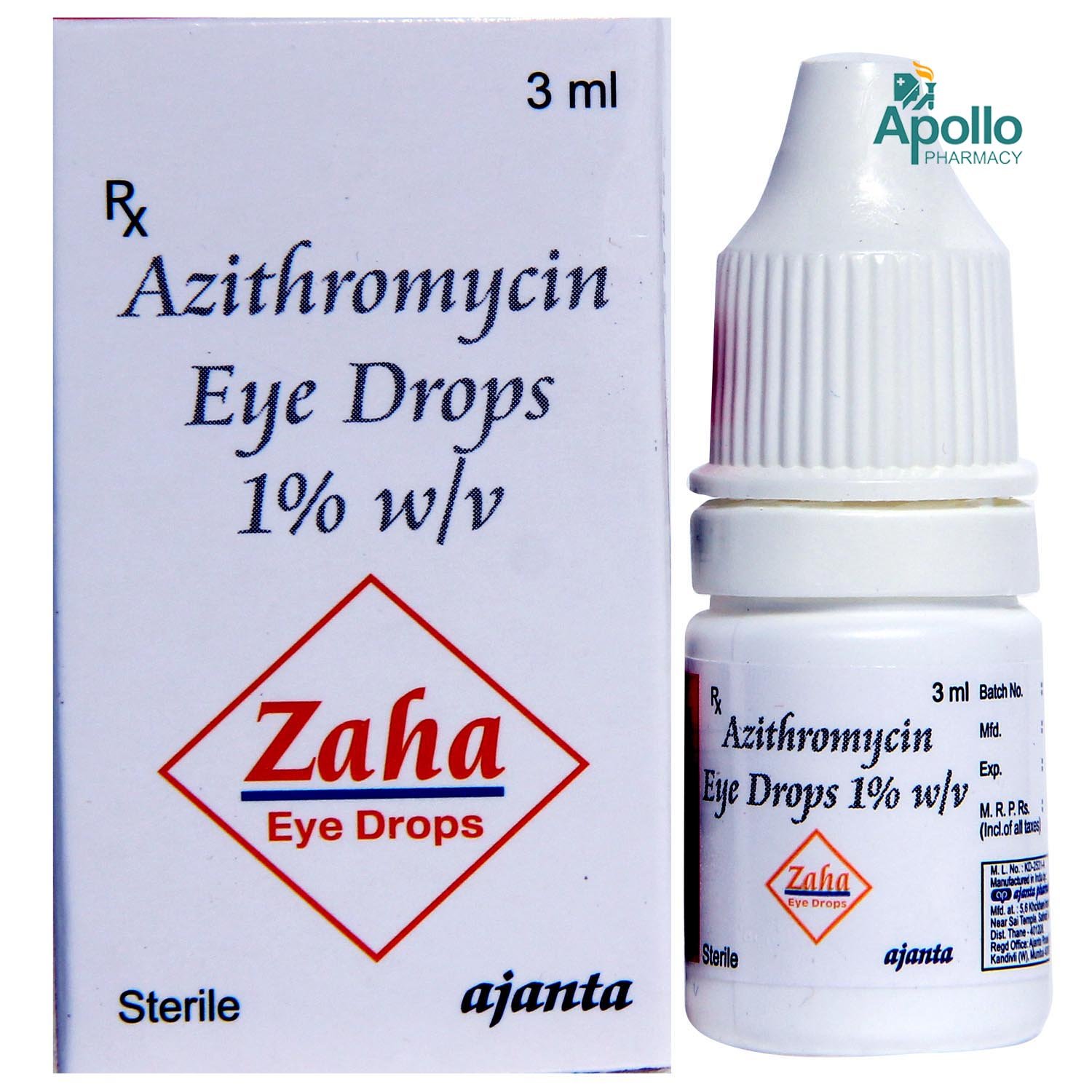Zaha Eye Drops 3 ml
MRP ₹193
(Inclusive of all Taxes)
₹28.9 Cashback (15%)
Provide Delivery Location

secured payment

india's most trusted pharmacy

genuine products
Composition :
Manufacturer/Marketer :
Consume Type :
Expires on or after :
Return Policy :
About Zaha Eye Drops 3 ml
Zaha Eye Drops 3 ml belongs to the class of macrolide antibiotics used to treat bacterial infections of the eye such as bacterial conjunctivitis and trachoma conjunctivitis. An inflammation or infection of the transparent membrane that lines the eyelids and eyes is known as bacterial conjunctivitis. Trachoma conjunctivitis is an eye infection caused by Chlamydia trachomatis.
Zaha Eye Drops 3 ml contains azithromycin which works by killing the conjunctivitis-causing bacteria. Thus Zaha Eye Drops 3 ml treats bacterial eye infections.
Use Zaha Eye Drops 3 ml as prescribed by your doctor. The common side-effects of Zaha Eye Drops 3 ml are burning/stinging sensation, redness and temporary blurred vision. Most of these side effects fade away gradually over time without the need for medical intervention. However, consult your doctor if you experience these side effects frequently.
Zaha Eye Drops 3 ml is for ophthalmic (eye) use only; do not inject or swallow. Do not use Zaha Eye Drops 3 ml if you are allergic to azithromycin, any other macrolide antibiotic, medium-chain triglycerides, or any of the components in Zaha Eye Drops 3 ml. If you are pregnant or breastfeeding, notify your doctor. Zaha Eye Drops 3 ml may temporarily blur your vision; therefore wait until your vision is back to normal before using any machinery or driving.
Uses of Zaha Eye Drops 3 ml

Have a query?
Directions for Use
Key Benefits
Zaha Eye Drops 3 ml is used to treat bacterial infections of the eye such as bacterial conjunctivitis and trachoma conjunctivitis. Zaha Eye Drops 3 ml contains azithromycin which works by killing the conjunctivitis-causing bacteria. Thus Zaha Eye Drops 3 ml treats bacterial eye infections.
Storage
- If you suspect the medication may be affecting your vision, consult your doctor or an eye specialist.
- Get your vision checked before and during treatment to monitor for any problems.
- You may need to adjust or stop your medication to manage side effects.
- Vision loss due to high pressure inside the eye (intraocular pressure) can be treated with medication or laser therapy.
- Cataract-related vision loss may require surgery.
- Eating a diet rich in fruits and vegetables, including carrots and dark leafy greens such as kale, spinach, and collard greens, can provide essential nutrients to help keep your eyes healthy.
Drug Warnings
Do not use Zaha Eye Drops 3 ml if you are allergic to azithromycin, any other macrolide antibiotic, medium-chain triglycerides, or any of the components in Zaha Eye Drops 3 ml. Consult your doctor if you are pregnant or breastfeeding. After using Zaha Eye Drops 3 ml, you may experience temporary blurred vision; therefore, wait until your vision returns to normal before driving or operating any machinery. Inform your doctor if you have vision issues, severe eye pain, glaucoma (high blood pressure in the eye), eye damage, or eye surgery before using Zaha Eye Drops 3 ml.
Drug-Drug Interactions
Drug-Drug Interactions
Login/Sign Up
Co-administration of Zaha Eye Drops 3 ml with Ziprasidone can increase the risk of irregular heart rhythm.
How to manage the interaction:
Although there is an interaction between Ziprasidone and Zaha Eye Drops 3 ml but can be taken together if prescribed by a doctor. Contact a doctor immediately if you experience sudden dizziness, lightheadedness, fainting, shortness of breath. Do not discontinue any medications without consulting a doctor.
Taking Zaha Eye Drops 3 ml with anagrelide may increase the risk of an abnormal heart rhythm. If you're dealing with other cardiac illnesses, electrolyte imbalances (for example, magnesium or potassium loss likely due to serious or prolonged diarrhoea or vomiting), you may be at greater risk.
How to manage the interaction:
Although using Zaha Eye Drops 3 ml and anagrelide together can possibly result in an interaction, it can be taken if your doctor has advised it. However, if you experience sudden dizziness, lightheadedness, fainting, breathing difficulty, or rapid heartbeat, consult the doctor immediately. Do not stop any medications without a doctor's advice.
Taking Zaha Eye Drops 3 ml with Moxifloxacin increases the risk of an abnormal heart rhythm.
How to manage the interaction:
Although administration of Zaha Eye Drops 3 ml alongside Moxifloxacin can result in an interaction, it can be taken if a doctor has advised it. However, if you experience dizziness, breathing difficulty, or rapid heartbeat, consult the doctor immediately. Do not stop any medications without a doctor's advice.
Taking Zaha Eye Drops 3 ml with citalopram may increase the risk of an abnormal heart rhythm.
How to manage the interaction:
Although using Zaha Eye Drops 3 ml alongside citalopram can result in an interaction, it can be taken if a doctor has advised it. However, if you experience sudden dizziness, lightheadedness, fainting, breathing difficulty, or rapid heartbeat, consult the doctor immediately. Do not stop any medications without a doctor's advice.
Taking Zaha Eye Drops 3 ml with fingolimod increases the risk of an abnormal heart rhythm.
How to manage the interaction:
Though administration of Zaha Eye Drops 3 ml alongside fingolimod can result in an interaction, it can be taken if a doctor has advised it. However, if you experience sudden dizziness, lightheadedness, fainting, breathing difficulty, or rapid heartbeat, consult the doctor immediately. Do not stop any medications without a doctor's advice.
Teriflunomide can cause liver issues, and combining it with Zaha Eye Drops 3 ml, can raise the risk.
How to manage the interaction:
Although administration of Zaha Eye Drops 3 ml alongside teriflunomide can result in an interaction, it can be taken if a doctor has advised it. However, if you notice fever, chills, joint pain or swelling, unusual bleeding or bruising, skin rash, itching, loss of appetite, fatigue, nausea, vomiting, abdominal pain, dark colored urine, light colored stools, and/or yellowing of the skin or eyes, contact a doctor right away. Do not discontinue any medications without consulting a doctor. Do not stop using any medications without talking to a doctor.
Taking Zaha Eye Drops 3 ml with efavirenz increases the risk of an abnormal heart rhythm.
How to manage the interaction:
Though administration of Zaha Eye Drops 3 ml alongside efavirenz can result in an interaction, it can be taken if a doctor has advised it. However, if you experience abrupt dizziness, lightheadedness, fainting, shortness of breath, or heart palpitations, get medical treatment immediately. Do not discontinue any medications without consulting a doctor.
Taking Zaha Eye Drops 3 ml with methadone increases the risk of an abnormal heart rhythm.
How to manage the interaction:
Although administration of Zaha Eye Drops 3 ml alongside methadone can result in an interaction, it can be taken if a doctor has advised it. However, if you experience sudden dizziness, lightheadedness, fainting, shortness of breath, or rapid heartbeat, get medical treatment immediately. Do not discontinue any medications without consulting a doctor.
Taking Zaha Eye Drops 3 ml with leflunomide can cause liver problems.
How to manage the interaction:
Although there is an interaction between Zaha Eye Drops 3 ml and leflunomide, they can be taken together if prescribed by a doctor. However, consult a doctor if you experience fever, chills, joint pain or swelling, unusual bleeding or bruising, skin rash, itching, less desire to eat, fatigue, nausea, vomiting, abdominal pain, and/or yellowing of the skin or eyes. Do not discontinue any medications without consulting a doctor.
Taking Zaha Eye Drops 3 ml with papaverine increases the risk of an abnormal heart rhythm.
How to manage the interaction:
Although administration of Zaha Eye Drops 3 ml alongside papaverine can result in an interaction, it can be taken if a doctor has advised it. However, if you experience sudden dizziness, lightheadedness, fainting, breathing difficulty, or rapid heartbeat, consult the doctor immediately. Do not stop any medications without a doctor's advice.
Drug-Food Interactions
Drug-Food Interactions
Login/Sign Up
Diet & Lifestyle Advise
- Sleep for at least six to eight hours to rejuvenate your eyes naturally.
- Wash your eyes with clean water at least two to three times a day. Do not wash your eyes for at least two weeks if you have undergone eye surgery.
- Manage stress, eat healthily, drink plenty of water, exercise regularly, and get plenty of sleep.
- Avoid alcoholic beverages as they can make you dehydrated and affect your sleep. This can also affect your body’s ability to fight off infections.
Habit Forming
Therapeutic Class
Alcohol
Safe if prescribed
It is not known if alcohol interacts with Zaha Eye Drops 3 ml. Please consult your doctor.
Pregnancy
Consult your doctor
Please consult your doctor if you are pregnant. Your doctor will prescribe only if the benefits outweigh the risks.
Breast Feeding
Consult your doctor
Zaha Eye Drops 3 ml can be used during breastfeeding if prescribed by the doctor.
Driving
Safe if prescribed
Zaha Eye Drops 3 ml may cause temporary blurred vision. Wait until your vision returns to normal before driving or operating any machinery.
Liver
Consult your doctor
Limited information is available about the use of Zaha Eye Drops 3 ml in patients suffering from liver impairment. Please consult your doctor. Your doctor will prescribe only if the benefits outweigh the risks.
Kidney
Consult your doctor
Limited information is available about the use of Zaha Eye Drops 3 ml in patients suffering from kidney impairment. Please consult your doctor. Your doctor will prescribe only if the benefits outweigh the risks.
Children
Safe if prescribed
Zaha Eye Drops 3 ml can be used in children if advised by the doctor.
FAQs
Zaha Eye Drops 3 ml works by killing the infection-causing bacteria. Thus Zaha Eye Drops 3 ml treats bacterial eye infections.
Use Zaha Eye Drops 3 ml only for the duration recommended by your doctor. Do not use it for more than the recommended duration. Inform your doctor if the eye infection does not improve after three days of using Zaha Eye Drops 3 ml.
Zaha Eye Drops 3 ml can be used with other eye medications if prescribed by the doctor. Maintain a gap of 15 minutes between Zaha Eye Drops 3 ml and other eye medications. Use other eye medications first, wait for 15 minutes and then use Zaha Eye Drops 3 ml.
Do not wear contact lenses while using Zaha Eye Drops 3 ml. Remove contact lenses before using Zaha Eye Drops 3 ml. It is advised to wear spectacles and avoid contact lenses until the infection is cleared.
Zaha Eye Drops 3 ml may temporarily blur the vision. Therefore, wait until your vision is clear before driving or operating machinery to prevent any mishappening.
Country of origin
Manufacturer/Marketer address
Disclaimer
Keep Refrigerated. Do not freeze.Prepaid payment required.
Author Details
We provide you with authentic, trustworthy and relevant information








_0.jpg?tr=q-85)
